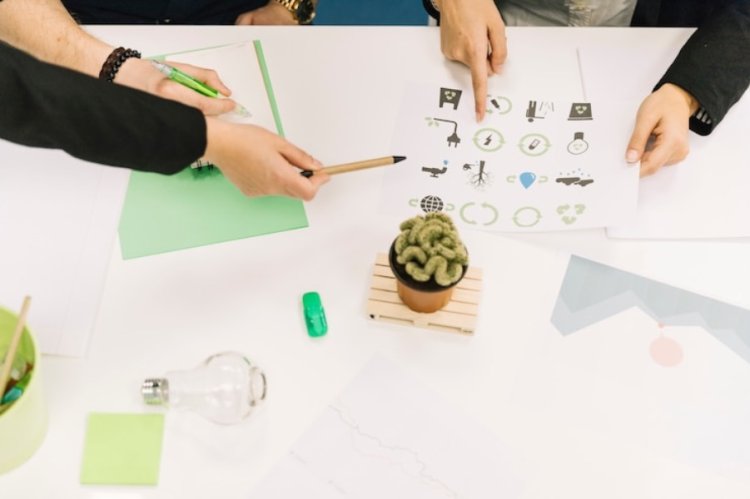Makersite Raises $70 Million For Green Product Design
Makersite raises $70M to boost AI-driven platform helping manufacturers design greener, safer, cost-efficient products.

Stuttgart-based supply chain intelligence business Makersite has said that a €60 million (about $70 million) Series B investment round has concluded successfully, a major advancement for the green technology and manufacturing industry. The capital injection seeks to forward the company's goal of assisting manufacturers create and produce more environmentally friendly, safer, and more affordable items. Leading the financing round were worldwide investment companies Lightrock and Partech; Schneider Electric's SE Ventures, Hitachi Ventures, KOMPAS VC, Translink Capital, and Planet A participated.
Founded in 2018, Makersite has become a leading player in the field of Product Lifecycle Intelligence. Using artificial intelligence, its platform produces digital twins of manufactured goods, hence providing companies with a full, real-time picture of their products' supply chains. This visibility lets producers evaluate safety and compliance standards, measure carbon footprints, control expenses, and make wise sourcing choices. As sustainability, cost, and regulatory compliance become core priorities for businesses everywhere, Makersite is setting itself as a crucial enabler in the run toward responsible product design.
Simulating and examining the whole product life cycle using Makersite's AI-driven software is at the foundation of its platform. This system allows customers to assess emissions and trash as well as locate more environmentally friendly materials and suppliers and gauge environmental effects. Such data-driven technologies are proving to be absolutely essential as companies come under growing pressure from consumers, investors, and regulators to minimize their environmental impact. Makersite's capacity to incorporate lifecycle data into the early phases of design helps producers to circumvent expensive errors and re-engineering, therefore attaining sustainability via design rather than as an afterthought.
The capacity to produce Environmental Product Declarations (EPDs) at scale stands out among the features of the platform. Large businesses have found this to be especially helpful. Microsoft is, for instance, using Makersite to cut the carbon footprint of its Surface Pro 10 laptop by up to 28%. Global energy management and automation powerhouse Schneider Electric is also leveraging the platform to promote eco-design projects across a sizable product catalog including over 200,000 stock-keeping units (SKUs). These high-impact applications highlight the platform's adaptability and worth in several businesses and product categories.
Talking on the most recent financing, Neil D'Souza, CEO and originator of Makersite, stressed the strategic importance of this investment, particularly in today's unstable global economy. "This investment represents a crucial milestone in our effort to make sustainable product design the default. D'Souza noted, "Securing this degree of commitment—especially in today's uncertain economic and geopolitical environment—shows the strength of our business case and the urgency of our mission. " The funding will let us speed up platform development, improve integration with our technological partners, and extend our worldwide effect. "
Investors have come to MakerSite not just for its technical possibilities but also for its obvious business momentum and increasing consumer base. Partners at Lightrock, Chris Steinau, clarified the reasons for their investment. "Makersite's amazing technology and obvious market traction position them as a future leader in guiding manufacturers through the challenging world of today and produce genuine, verifiable influence," Steinau said. "Our commitment to Makersite reflects our strong confidence in their vision and their unique approach—treating sustainability as a balanced trade-off between cost, safety, and environmental performance, rather than just a 'green' checkbox. "
The fresh money arrives in line with a larger trend whereby international businesses are looking for means to manage operational expenses, reduce supply chain emissions, and match with changing environmental rules. The need to lower Scope 3 emissions—those not directly related to a company's value chain—has particularly applicable lifecycle analysis techniques like Makersite's. The need for detailed, dependable supply chain data has never been greater as more companies adopt circular economy ideas and environmentally friendly methods.
Makersite intends to improve its core platform, boost artificial intelligence capabilities, and reach internationally with this funding. Through strategic partnerships and technical collaborations, the company aims to deepen integration with enterprise systems and software solutions utilized by producers so that sustainable decision-making becomes more smooth and accessible.
The increasing fascination in digital twins, life cycle assessment (LCA), and embedded sustainability analytics reflects a bigger change in how producers are rethinking product creation. From energy consumption and material toxicity to compliance with future rules like the EU Green Deal and extended producer responsibility laws, sustainability is no longer a niche subject—it is a core need. Makersite helps companies to innovate rather than merely adjust to these developments.
Makersite is showing how profitability and sustainability might coincide as it gets ready for its next phase of growth. Backed heavily by impact-driven and strategic investors, the business is positioned to affect how products are conceived, obtained, and constructed—therefore making environmentally responsible design the rule rather than an outlier.
What's Your Reaction?

















